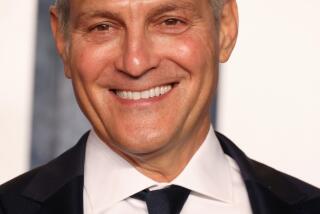VIEWPOINTS : The Problem With Today’s Executive Heroes
- Share via
It’s almost impossible to pick up a book, watch television news or leaf through People magazine without getting one more glimpse of America’s top executives as celebrities. Even “Miami Vice” recently featured Lee A. Iacocca in a cameo role.
The captains of industry are back. Not in the scoundrel roles that society assigned them as recently as the 1970s, but as folk heroes. While this seems good news for the business community, our enthusiasm should be tempered. The sheer volume of uncritical adulation is troubling.
Magazines, audio and videocassettes, brochures and books extolling the virtues of corporate leadership proliferate. A recent issue of Psychology Today, for instance, reviews five books and notes that “all portray the corporate leader as teacher, mentor, exemplar and forger of values and meaning.”
Recent books include “The Great Getty”; “Geneen”; Tom Peters’ latest offering, “Passion for Excellence, the Leadership Difference”; “Making it Happen” (about 1984 Olympics chief Peter Ueberroth); “CEO: Corporate Leadership in Action”; “The Power to Lead” and “The Big Time” (about the extraordinarily successful Harvard Business School class of 1949).
High-level executives are getting the full celebrity treatment. In fact, my two teen-age sons, neither of whom is a business major, recognize the names Iacocca, T. Boone Pickens Jr., Ted Turner, Armand Hammer, Steven P. Jobs, Harold Geneen, Victor Kiam, Frank Borman and Sandy Sigoloff as readily as they recognize those of rock stars.
Forget the Robber Barons
What a contrast between today’s adulation for captains of industry and the universal hatred for their 19th-Century counterparts, the so-called Robber Barons. Jay Gould was known as one of the worst stinkers in American business, and many other corporate leaders of the time suffered similar opprobrium.
Why has the contemporary corporate leader re-emerged as an authentic American hero?
A case can be made that rapid advances in technology, widespread deregulation, economic upheaval and social change have vastly complicated the chief executive’s role, while simultaneously raising the stakes of his decisions and heightening his visibility. A contradictory explanation is that the current business climate is the most favorable in years and thus permits corporate stars to shine especially brightly. A third, discouraging, explanation is that selfishness is suddenly respectable; in a nation full of yuppies bent on acquiring status symbols, nothing may be held in greater esteem than a position at the top rung of the corporate ladder. A fourth, quite human, explanation is that in this volatile world, a strong business executive is a far more reliable hero than, say, a rock star.
A different explanation is rooted in history. By cultural tradition, American society glorifies the individual. The chief exponent of this tradition was Ralph Waldo Emerson, who guided a movement that emphasized humanism and the spiritual self. Upon leaving the Unitarian Church, in which he was an ordained minister, he made individualism his religion. While Emerson meant to give people courage to follow their own instincts, he unwittingly created a platform for American enterprise and a philosophical basis for corporate tycoons. To this day--especially today--we’re drawn to powerful individuals. And there are no individuals among us more powerful than the captains of industry.
Creating Idol Worshipers
What’s so bad about feeling good about these corporate superstars? Plenty.
Cults develop around such chieftains. Idolatry spawns lackeys, not leaders. Everybody begins to think the way their leader thinks. Problems of succession develop. Corporate superstars eclipse not only the competition, but their own subordinates. When they move on, their companies suffer from months or years of instability while searching for someone to fill their outsized shoes. CBS, for example, has been in such turmoil since the 1983 departure of Chairman William S. Paley that it recently was forced to bring him back.
Idolatry tends to go to a chief executive’s head. Top officers sometimes behave like mini-emperors, inclined to get rid of those who dissent or have better ideas. They have imperial habits and tastes that can cost the company dearly. The T. Boone Pickenses and Carl C. Icahns are building their individual power bases at the expense of the entire corporate community and, ultimately, the American public.
Then there is the Oz factor. Far too often, the most imperious corporate stars are empty suits, all sound and fury, signifying nothing. High visibility has nothing to do with getting the job done. Eastern Airlines hired Frank Borman because he was an astronaut, a genuine celebrity, and seemed an ideal spokesman. He’s out now because Eastern needed action more than talk. The no-name executive team at Ford consistently outclasses the stars at Chrysler and GM.
Ironically, the problem contains its own solution. Currently, the burnout rate for these corporate superstars is very high. A recent study showed that a turnover of chief executives in large companies occurs, on average, every seven years. Robert Townsend, who made Avis try harder, has said that the average life of a corporate star is more like three to five years. Obviously, stardom is healthy neither for the executives nor the companies. And so the day may not be far off when corporations stop being one-man shows and become team efforts again.
More to Read
Sign up for our Book Club newsletter
Get the latest news, events and more from the Los Angeles Times Book Club, and help us get L.A. reading and talking.
You may occasionally receive promotional content from the Los Angeles Times.







